Films with theme "Films about racism", sorted by production date
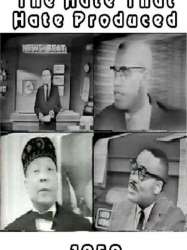
The Hate That Hate Produced (1959)
Genres Documentary
Themes Films about racism, Political films
Actors MalcolmX
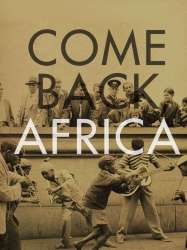
Come Back, Africa (1959)
, 1h35Directed by Lionel Rogosin
Origin USA
Genres Drama, Documentary
Themes Films set in Africa, Films about racism
Actors Miriam Makeba
Come Back, Africa comprises a storyline acted out by black South Africans from whose own experiences the film's events are drawn.
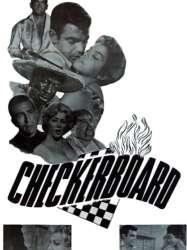
Checkerboard (1959)
, 2h5Directed by Claude Bernard-Aubert
Origin France
Genres Drama, Comedy-drama
Themes Films about racism
Actors Jacques Richard, Grégoire Aslan, Douta Seck, Doudou Babet, Milly Vitale, Roger Blin
Dans la ville de Cicada, naguère florissante grâce à un barrage désormais détruit, règne la ségrégation raciale. Mais une histoire d'amour débute entre deux jeunes gens, le Blanc Bob Stanley et la Noire Bessie Vance, ce qui provoque un déchaînement de violence entre communautés. La découverte d'une source va permettre la réconciliation des familles de Bob et de Bessie qui abandonneront Cicada pour créer une nouvelle ville.
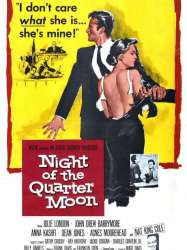
Night of the Quarter Moon (1959)
, 1h36Directed by Hugo Haas
Origin USA
Genres Drama
Themes Films about racism
Actors Julie London, John Drew Barrymore, Anna Kashfi, Dean Jones, Agnes Moorehead, Nat King Cole
A young man returns home with a new bride, but his family objects when they learn she is of mixed race.

I Accuse! (1958)
, 1h32Directed by José Ferrer
Origin United-kingdom
Genres Drama, Biography, Historical
Themes Spy films, Films about racism, Films about religion, Films about Jews and Judaism, Histoire de France
Actors Anton Walbrook, José Ferrer, Viveca Lindfors, Leo Genn, Emlyn Williams, David Farrar
Accusé à tort d'espionnage, le capitaine Alfred Dreyfus fut dégradé et condamné à la déportation à vie.

Sayonara (1957)
, 2h27Directed by Joshua Logan
Origin USA
Genres Drama, Melodrama, Romance
Themes Seafaring films, Politique, Films about racism, Transport films, Aviation films, Political films
Actors Marlon Brando, Patricia Owens, James Garner, Martha Scott, Miiko Taka, Miyoshi Umeki
Major Lloyd "Ace" Gruver (Marlon Brando), the son of a U.S. Army general, is stationed at Itami Air Force Base near Kobe, Japan. He falls in love with a Japanese entertainer, Hana-ogi (Miiko Taka), who is a performer for a Takarazuka-like theater company, whom he meets through his enlisted crew chief, Airman Joe Kelly (Red Buttons).

Band of Angels (1957)
, 2h5Directed by Raoul Walsh
Origin USA
Genres Drama, Action, Adventure, Historical, Romance
Themes Films about slavery, Films about racism, Political films
Actors Clark Gable, Yvonne De Carlo, Sidney Poitier, Efrem Zimbalist II, Patric Knowles, Rex Reason
Amantha Starr (Yvonne De Carlo) is raised as the privileged white daughter of a Kentucky plantation owner. However, after he dies, a shocking secret is revealed: unbeknownst to Amantha, her mother had been one of her father's black slaves. Legally now property, she is taken by a slave trader to New Orleans to be sold. On the riverboat ride there, he makes it clear that he intends to sleep with her, but desists when she tries to hang herself; as a beautiful, cultured young woman who can pass for white, she is far too valuable to risk losing.

The Mark of the Hawk (1957)
Origin USA
Genres Drama, Historical
Themes Films about racism
Actors Sidney Poitier, Eartha Kitt, John McIntire, Juano Hernández, Marne Maitland, Patrick Allen
Obam (Sidney Poitier), brother of an indigenous resistance leader (Clifton Macklin) in British colonial Africa, returns to his troubled homeland after some years abroad, seeking a political post. However, domestic tensions have divided the country into two hostile camps, with many natives demanding the return of their ancestral lands - now farmed by European settlers. Britain and the local white administration are determined not to release their stranglehold; rather than adopting violence Obam seeks racial equality through peaceful means. His motives are frequently questioned by his own people, but with the assistance of an insightful spouse (Eartha Kitt) and sympathetic missionary Bruce Craig (John McIntire), this unlikely newcomer to African nationalism fights to make a meaningful difference before the situation deteriorates further.

Cry of the Bewitched (1957)
, 1h25Directed by Alfredo B. Crevenna
Origin Cuba
Genres Horror, Musical, Romance
Themes Films about slavery, Seafaring films, Films about racism, Transport films
Actors Ninón Sevilla, Olga Guillot, Ramón Gay
The story takes place in Cuba in 1850, in the era of the Black slave trade. In a sugar cane plantation, Captain Jorge (Ramón Gay) and his wife, Beatriz (Rosa Elena Durgel) live happily: are expecting a child, and their slaves live quiet and at peace with them. But one night, as the full moon appears, the sound of drums rises in the air. Yambao (Ninón Sevilla), the granddaughter of a witch supposed murdered 15 years ago named Caridad (Fedora Capdevila), has reappeared. The plantation slaves begin to fear. Her grandmother was killed by them due to black magic and curses that fell on the plantation thanks to her. Yambao's arrival coincides with a new outbreak of black vomit, not appearing on the plantation for decades, and all attributed the situation to the black magic of the girl. Yambao it's not really bad, but Caridad, who actually survived her assassination attempt, is the one who fills her heart with hatred and revenge. Jorge stays out of the traditions and customs of his slaves, but when he discovers that these want to sacrifice the girl, decides to intervene. Jorge saves Yambao, who swears eternal gratitude. But the girl starts to fall for him. Her grandmother decided to take advantage of this feeling from her revenge. Yambao decides to perform a magic ritual of Santeria over Jorge to make him love her. Her magic spell coincides with the contagion of Jorge of the epidemic plague. The doctors did not give hopes to Jorge. Yambao decides to intervene and offered her to cure him in gratitude for saving her life. The contact with Jorge, rooted even more her feelings. When Jorge manages to save himself from danger, he begins to feel the desire to be near of Yambao, which suggests that the spell has worked. For several weeks Jorge is delivered with passion for Yambao, forgetting his wife, his plantation and all his duties. However, when Jorge is informed that his wife is about to give birth, he runs to her side, and when his child born, his mind is clear and decides to return to his family. Yambao seeks revenge, and advised by Caridad decides to kill the wife and the son of Jorge. Fortunately, when about to consummate the crime, her grandmother, Caridad, is discovered by the foreman of the plantation, who kills her with a machete. Yambao flees in horror, promising not to cause any damage. The witch Caridad is the subject of a funeral ceremony with exotic rituals. At the end of the ritual, Yambao decides to end her own life by jumping off a cliff, to the astonishment of Jorge.
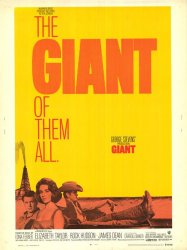
Giant (1956)
, 3h21Directed by Fred Guiol, George Stevens
Origin USA
Genres Drama, Action, Romance, Western
Themes Films about families, Films about racism
Actors Elizabeth Taylor, Rock Hudson, James Dean, Carroll Baker, Nick Adams, Mercedes McCambridge
The movie follows a Texas family over a quarter century from the 1920s until after World War II. Themes of discrimination along race, class and gender lines, as well as the role they played in the social evolution of post-war Texas, are prominent.
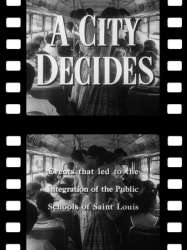
A City Decides (1956)
, 27minutesDirected by Charles Guggenheim
Origin USA
Genres Documentary
Themes Films about education, Films about racism, Documentary films about racism, Documentary films about law, Documentary films about historical events, Documentaire sur une personnalité, Documentary films about politics, Political films

Bad Day at Black Rock (1955)
, 1h21Directed by John Sturges
Origin USA
Genres Drama, Thriller, Action, Crime, Western
Themes Films about racism
Actors Spencer Tracy, Robert Ryan, Anne Francis, Dean Jagger, Walter Brennan, Ernest Borgnine
In late 1945, one-armed John J. Macreedy (Spencer Tracy) gets off a passenger train at the isolated desert hamlet of Black Rock. It is the first time in 4 years that the train has stopped there. Macreedy is looking for a man named Komoko, but the few residents are inexplicably hostile. The young hotel desk clerk, Pete Wirth (John Ericson), claims he has no vacant rooms. Macreedy is threatened by Hector David (Lee Marvin). Later, Reno Smith (Robert Ryan) informs Macreedy that Komoko, a Japanese-American, was interned during World War II.

Mulata (1954)
, 1h20Directed by Gilberto Martínez Solares
Genres Drama
Themes Seafaring films, Films about racism, Transport films
Actors Ninón Sevilla, Pedro Armendáriz, René Cardona, Fanny Schiller
In the Havana port, two mulatto children, Mateo (Ricardo Román) and Caridad (Ninón Sevilla) grow together. She is the daughter of a white man who died in a shipwreck, and a black laundress of African origin. Over the years, Mateo falls for Caridad, but she is in love with a Mexican captain, Martin (Pedro Armendáriz), who accidentally met her at the port. The captain was also in love with Caridad and offers live together and she accepts. Caridad work in a cabaret in the port and the owner, Guevara (René Cardona), are attracted to the girl, and in a moment of jealousy, tries to kill Martin. Martin falls in financial trouble and have to mortgage his boat to Guevara. When Martin returns to Veracruz, Mexico, Guevara feels himself like the new owner of Caridad.

Statues Also Die (1953)
, 30minutesDirected by Chris Marker, Alain Resnais
Origin France
Genres Documentary
Themes Films set in Africa, Films about racism, Documentary films about racism, Documentary films about law, Documentary films about historical events, Documentary films about politics, Political films
Actors Jean Négroni
The film exhibits a series of sculptures, masks and other traditional art from Sub-Saharan Africa. The images are frequently set to music and cut to the music's pace. The narrator focuses on the emotional qualities of the objects, and discusses the perception of African sculptures from a historical and contemporary European perspective. Only occasionally does the film provide the geographical origin, time period or other contextual information about the objects. The idea of a dead statue is explained as a statue which has lost its original significance and become reduced to a museum object, similarly to a dead person who can be found in history books. Interweaved with the objects are a few scenes of Africans performing traditional music and dances, as well as the death of a disemboweled gorilla.

Toxi (1952)
, 1h29Directed by Robert A. Stemmle
Genres Drama
Themes Films about racism
Actors Paul Bildt, Johanna Hofer, Ingeborg Körner, Carola Höhn, Ernst Waldow, Erika von Thellmann
The melodrama, film begins with a young Afro-German girl being left at the doorsteps of the Rose family—white middle-class Germans—assembled for a birthday party. Initially, most family members treat the young girl with relatively welcome arms as they believe she is only giving a performance as a birthday surprise from an aunt. The family later discovers a suitcase that was left on the doorsteps and realize that the young girl, Toxi, has in fact been abandoned. Once the family learns that Toxi has been abandoned there is a shift in feelings regarding their acceptance of her; the possibility of the girl spending more time at the home than was expected forces members of the family to confront their racism.
 Connection
Connection